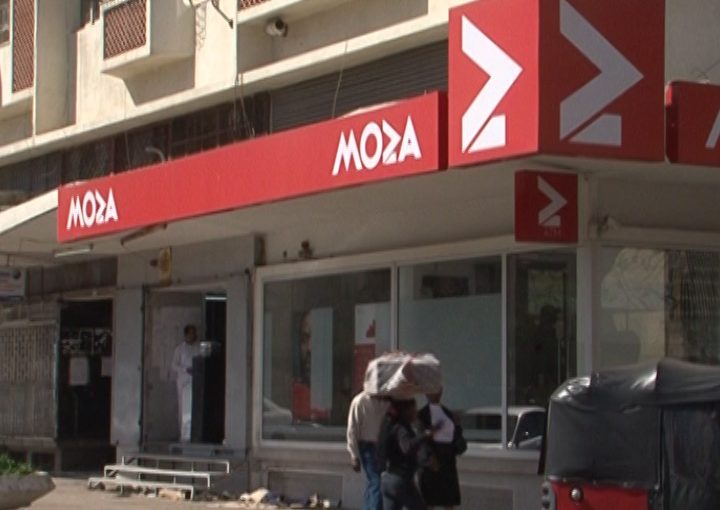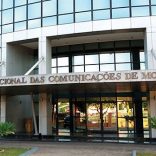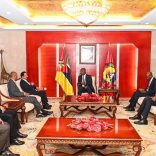Mozambique: INCM holds public consultation on consumer protection, disputes with operators
Ethics Commission’s document on Moza Banco recapitalisation was sent to PGR and GCCC – AIM report

TVM
Mozambique’s Central Public Ethics Commission (CCEP), set up under the law on public probity, has accused the governor of the Bank of Mozambique, Rogerio Zandamela, of a conflict of interests in the way the central bank handled the recapitalization of what had been the fifth largest commercial bank in the country, Moza Banco
Moza Banco was rescued from collapse through a takeover by Kuhanha, the body that manages the Bank of Mozambique pensions fund. The CCEP claims that Zandamela violated the public probity law by deciding on a matter in which he is a beneficiary, since the governor of the central bank is automatically chairperson of Kuhanha, which created a potential conflict of interest.
Kuhanha is a body owned by the central bank, and chaired by its governor – so when the governor headed a process whereby Kuhanha became the major shareholder in Moza Banco, he was violating the public probity law.
Zandamela, however, had publicly argued that recapitalisation via Kuhanha was the only means by which Moza could be saved from liquidation, and he had therefore acted in the interests of the stability of the Mozambican financial system.
Moza Bank suffered a liquidity crisis in mid-2016 and was in danger of being unable to meet its obligations to its clients. The Bank of Mozambique stepped in, sacked its Board of Directors, and installed a provisional board, under the chairmanship of one of the country’s most experienced bankers, Joao de Figueiredo.
When the existing shareholders, Mocambique Capitais (a grouping of about 400 Mozambican investors) and the Portuguese bank Novo Banco, proved unable or unwilling to capitalise the bank, an Evaluation Commission, set up by the central bank, received bids for Moza from other bodies interested in running the bank.
In May, the decision was taken to put Moza into Kuhanha’s hands, and make it responsible for recapitalising the bank. Under the new shareholding structure, Kuhanha holds 80 per cent of Moza. The existing shareholders retain the other 20 per cent – 10 per cent for Novo Banco and 10 per cent for Mocambique Capitais.
This led to an outcry in parts of the Mozambican press, with allegations that the deal constituted a conflict of interests. At a Maputo press conference on 19 June, Zandamela said the cries of rage had surprised him. “I was expecting society to celebrate”, he said, since the decision had avoided the collapse of what had been the fourth largest bank in the country.
He said that Kuhanha had not put in a bid for Moza. Handing the bank over to Kuhanha had been “Plan B”, when more orthodox options did not come to fruition. The central bank rejected some of the bids for Moza because the bidders only wanted to buy bits of the bank, but the deal agreed with the shareholders was to keep the bank going as a whole. Furthermore, Mozambican law does not envisage selling off parts of a bank.
Other bidders (and Zandamela did not say who they were) were suspected of intending to acquire Moza for money laundering purposes.
“People came who had the money”, he said. “But they were investors of a doubtful kind, who could not say where the money came from. That’s why we demanded a bank guarantee. We wanted to be sure that Moza Bank would not be used to launder money, and I’m not going to lie, there were indeed investors who came with those intentions”.
With no bidder making a proposal that satisfied the conditions laid down by the shareholders and by the central bank, the decision was taken to fall back on the contingency plan of using Kuhanha.
Also Read: Ethics Commission looking into Moza Bank
Zandamela pointed out that the Kuhanha takeover was welcomed by all those most closely involved in the matter – namely both existing shareholders (Mozambique Capitais and Novo Banco), and the banking regulatory authorities in Mozambique and in Portugal. He did not see why anybody else should make a fuss about it.
Zandamela insisted that the procedures followed had been entirely transparent and challenged anyone who doubted this to speak to other banks about what had happened. “I don’t know any other process that has been as transparent”, the governor said. “I challenge anyone here or outside the country to bring me evidence of illegality. Everything was done so that the whole process could be an example and a pride for the country”.
Also Read: Mozambique banks snared in debt crisis must merge to thrive – Bloomberg
Also Read: No budget or offices for Ethics Commission
The CCEP also accused Moza Bank charperson Joao Figueiredo of violating the Public Probity Law, because he had previously headed the provisional board of directors which the Bank of Mozambique had installed in September 2016. Under the terms of the law, the CCEP argued, Figueiredo was barred from taking up any position with Moza Banco until two years after he had ceased his duties as head of the provisional board.
Objections to Figueiredo had been raised earlier, and at his June press conference Zandamela vigorously defended the decision to appoint him. The governor the central bank had been looking for the best professional available to sort out the crisis at Moza.
Figueiredo “didn’t come here looking for a job”, said Zandamela. “We went after him. I insisted that he take the post”.
Also Read: Watch: Central Bank defends its handling of Moza crisis – AIM
Also Read: Moza Banco recapitalisation generates controversy in Mozambique
The CCEP also accused a former director of the Bank of Mozambique, Joana Matsombe, of breaking the law. She too was allegedly in a conflict of interests because she had been appointed a member of the provisional Moza Board , at a time when she was still on the board of the central bank.
There is no suggestion in the CCEP document that Zandamela, Figueiredo or Matsombe have personally profited from the recapitalisation of Moza Bank. Nonetheless, they might still be prosecuted. The CCEP has sent its findings to the Attorney-General’s Office (PGR) and to the Central Office for the Fight against Corruption (GCCC), and this could result in charges against the three.
Also Read: Mozambique appoints IMF official as central bank governor – Reuters












Leave a Reply
Be the First to Comment!
You must be logged in to post a comment.
You must be logged in to post a comment.